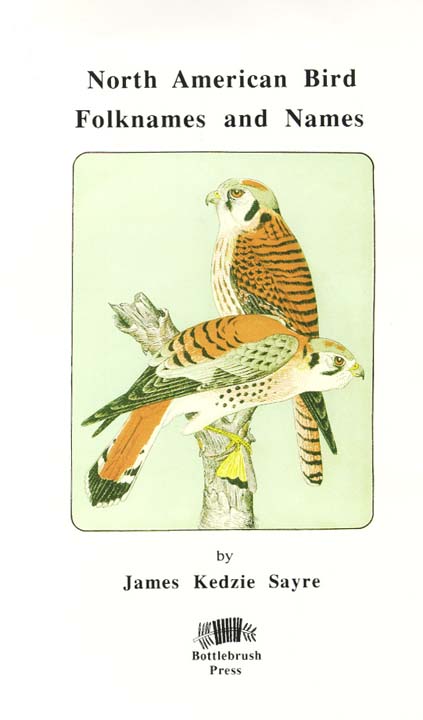North American Bird Folknames and Names

Book Features
- Over 8,000 names for the 500+ species of birds that breed in and regularly
visit North America
- Each folkname and name is fully indexed
- 75-page long detailed comprehensive etymology of the three hundred
most common bird names
- six pages of References
- 294 page paperback, perfect bound
- color picture of Two Sparrow Hawks featured on the front cover of the
book is from a 1903 pen, ink and watercolor drawing
- ISBN 0-96450-39-05
- Library of Congress Card Catalog Number 95-94257
- Copyright 1996
CHOICE Magazine Book Review, 10/96
"Sayre has prepared a compendium of names and folknames for more
than 500 North American birds. Many of these names are rapidly being forgotten,
even as birdwatching continues to grow in popularity; thus it fills a valuable
niche in the reference library. It is organized in taxonomic sequence,
so anyone who is familiar with a bird checklist should find it easy to
use. In addition to a complete index enabling the reader to determine which
bird was once called the "Pork'n Beans" (common nighthawk), the
author includes a discussion on the etymology of bird names, and a section
on British bird name origins. The book is easy to use, providing both entertainment
and utility. It should be in the reference section of any natural history
or academic library. General; undergraduates through faculty." - D.
A. Rintoul, Kansas State University.
Nature Canada Book Review, Spring, 1997
"What might a bog-pumping hell-driver be? What about a mosquito
hawk? Or an ant woodchuck? When you read this book, you'll discover that
they rare, respectively, the American bittern, the killdeer, and the flicker.
Its author (James) Kedzie Sayre, found a glaring hole in North American
ornithological literature. To fill it, he researched the contributions of
the first English and European settlers, and Mexican and Caribbean influences
to make a fascinating list of bird names. Over 8000 folknames and names
for over 500 species of North American birds are listed here. The first
75-page-section etymology explains the origin of common North American bird
names such as crow, coot, and kite, as well as some of those found in zoos.
The index is exhaustive and the author has also shared his primary sources
of information. I can attest to the usefulness of North American (Bird)
Folknames and Names firsthand. When a colleague came back from Yellowstone
recently and asked what an "ouzle" was, I didn't have a clue.
Even the local experts were dumbfounded, but an answer was quickly found
in this book. An ouzle turned out to be a dipper, which goes back to the
Old English "osle" for blackbird. Some of the names Kedzie has
listed are obvious, others witty, and others downright obscure. How do you
figure that the American wigeon turned into a zanzan? And I don't even want
to get into the warblers: a yellow-throated creeper is actually the yellow-throated
warbler, the yellow-crowned warbler is really the chestnut-sided warbler,
and the summer warbler and the willow warbler are both the yellow warbler
which also shares spider warbler with the yellow-rumped warbler. Confusing
as the names may be, this is a most useful book." - Cendrine Huemer.
End.
---------------------------------------------------------------------------------------------------------------------
Web pages originally designed by Bottlebrush Press and recently revised
by Greg Yahna and James Sayre.
Contact author James K. Sayre at sayresayre@yahoo.com. Author's Email:
sayresayre@yahoo.com
Copyright 2003 by Bottlebrush Press. All Rights Reserved.
Web page last updated on 9 June 2003.

